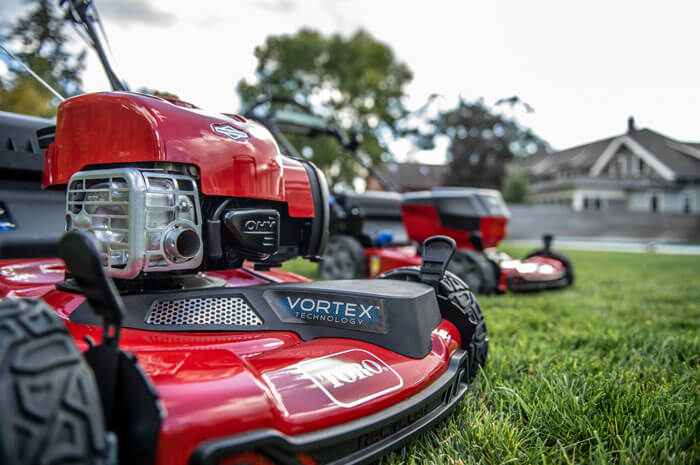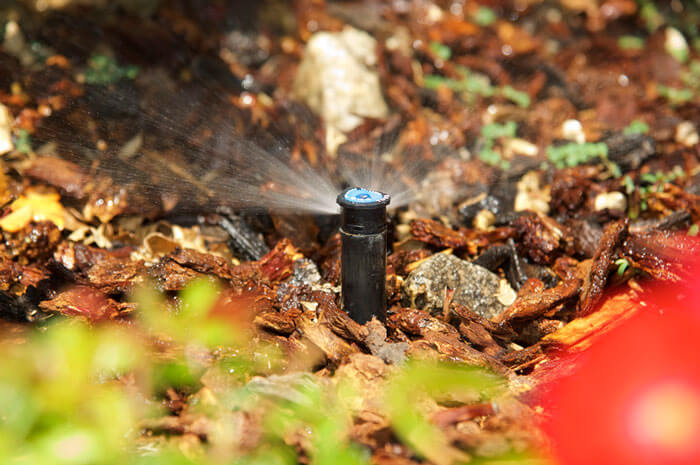
If you’re in the market for a new lawn mower, you’ve probably noticed the emergence of a newer trend — electric models showing up on shelves and showroom floors. You may even know some neighbors who have already ditched their gas mowers in favor of electric ones. So, what’s the story with gas versus electric lawn mowers? Why are people switching to electric, and why now?
Electric mowers aren’t actually new — the first model was produced back in 1930. But, without the technology to make lightweight, efficient batteries, original electric lawn mowers were corded. Even to this day, corded electric lawn mowers are still being sold, although they’ve never gained much popularity due to several concerns and limitations.
The surging popularity of electric lawn mowers is almost entirely due to new, efficient cordless models. Recent advances in battery technology have allowed cordless mowers to run longer and more powerfully than ever before, greatly improving their practicality. Thanks to these improvements, electric mowers are now a viable option for millions of Americans, and consumers are taking notice.
To find out if an electric model is right for you, let’s compare electric lawn mowers versus gas models, weighing the pros and cons of each.
Corded Electric Lawn Mowers
When you think about gas versus electric mowers, you may not give any consideration to corded mowers. But, corded electric mowers have been around for nearly a century, offering a steady alternative to more popular models. They’re dependable and low maintenance, with a powerful electric motor that never runs out of power. The designs are often compact and lightweight, making them easy to maneuver and store away. These lesser-known electric mowers are also quite affordable compared to their cordless or gasoline counterparts. So why aren’t they more popular?
Mainly, the cord! The cord acts as a tether, severely limiting where you can mow. This makes corded electric mowers impractical for most large or even medium-sized yards. There’s also the risk of mowing over the cord if you’re not careful, which is enough to make a lot of people think twice.
However, if you don’t mind handling cords — and only need to mow a small yard or patch of grass — a corded mower could be a great solution for you. They don’t take up much space and require very little forethought or preparation. There’s no need to charge batteries, buy gasoline or perform oil changes, which ensures that the gas combustion engine is properly lubricated. Just plug it in and start mowing!
Cordless Electric Lawn Mowers
If corded electric mowers don’t work for your situation, you’re probably curious about gas versus battery-powered lawn mowers. After all, these cordless electric mowers are starting to change the landscape of residential lawn care. They’ve become practical for the majority of properties, offering several benefits.
Cordless electric mowers run quietly, with absolutely zero engine exhaust emissions. For the eco-conscious crowd, this is a major advantage — especially when dealing with a larger lawn that requires more runtime. And, just like corded models, battery-powered mowers have reliable, low-maintenance electric motors. That means you won’t have to worry about any of the upkeep associated with combustion engines, such as changing out oil, filters and belts.
You also won’t have to buy and transport any gasoline, either. Simply charge your batteries before each use. Modern rechargeable batteries can often hold a charge long enough to mow a standard quarter-acre lot. In fact, the Toro 60V Max* 21″ Stripe™ Mower can run for up to 65 minutes!
Toro also offers the interchangeable Flex-Force Power System, which is not only the most powerful rechargeable battery in its class, but can be shared across multiple tools and machines — such as lawn mowers, snow blowers, leaf blowers, trimmers, edgers and more. This is a great way to simplify your lawn care, needing just one or two (if desired) batteries for all of your equipment.
Gas-Powered Lawn Mowers
Despite how it may sound, millions of Americans still prefer gas mowers versus electric models. Why? In general, gas-powered mowers have a lower upfront cost than comparable cordless electric models.
Gas mowers can also run for hours on a single tank, and can be refueled instantly (providing you have gasoline on hand). This gives them a major advantage on large properties, where runtime becomes a major factor. It’s also helpful to instantly fuel your machine if you ever mow spontaneously or think you may not remember to charge your batteries.
While this all sounds great, unfortunately, gas-powered mowers can be more expensive to operate — running on a more costly fuel and needing considerably more maintenance. It’s even possible that, over time, a gasoline mower’s upfront cost savings will be offset by its higher operating costs.
Do I Pick a Gas or Electric Mower?
Now that you’ve read about the benefits and drawbacks of corded electric, cordless electric and gas-powered mowers, you’re ready to evaluate what option is best for you. It’s important to remember, what works for your friends, relatives or even neighbors may not for your habits or yard. Prioritizing the best fit for your yard and lifestyle will give you years of happy, trouble-free mowing!
Do you have more questions about lawn mowers? Check out Toro’s Help Center for information, videos, maintenance tips and more!



